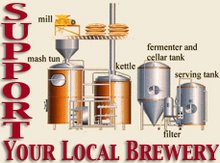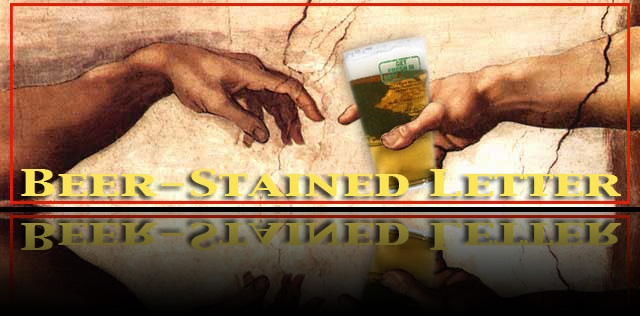River Horse's countdown to Lambertville exit
 |
| The brewery seen from across the canal |
Say you own a craft brewery that turns out some quite popular beers.
And for every batch of beer you make, part of the cleanup chore involves some aerial maneuvering: raising the forks on your forklift all the way up their mast so you can fetch a bin of spent grain raked from the mash tun at your second-floor brewhouse.
Try dealing with that about six times per brew day. Doable, but a little tricky, certainly logistically cumbersome, and a huge mess if one of the bins should accidentally fall.
 |
| Graining out the hard way |
Here's another scenario ...
Your distributors are due to pick up pallets of beer. So you need to know if they're bringing the 40-foot truck or one about half that size. Uh, it's the long one? Please get here early.
The cramped local road your brewery sits along is the only access, and it's dotted with some homes, offices and galleries ... it's not exactly ideal, having big commercial trucks navigating that narrow lane.
So what would you do under those circumstances? Probably move.
River Horse Brewing is.
For those reasons and more, River Horse is exiting its 17-year home of Lambertville, heading about 15 miles south to Ewing, outside of Trenton, to a single-floor, stand-alone building in a business park along Graphics Drive.
 |
| The new location on Graphics Drive |
The new location in Mercer County promises to cure a lot of River Horse's current headaches, big and small, as it serves both immediate and future growth needs.
"It's been a cautious path, this move," says Chris Walsh, who bought the brewery with co-owner Glenn Bernabeo in 2007, a time when River Horse was pretty much a withering brewery, a label in some serious trouble.
"We wanted to do it for a long time, but in the beginning we had to fix the business. A move then, it would have been too much. We had to get the brand stable."
They did. And then some.
 |
| The brewhouse on the 2nd floor |
River Horse is New Jersey's second-largest craft brewery, coming in behind Flying Fish Brewing, which itself moved just last year from its original home of Cherry Hill to nearby Somerdale.
These days, River Horse cranks out almost 10,000 barrels of beer a year, a tide of draft and bottled ales, both big and sessionable, in five year-round brews, plus five seasonals (brewer's reserve beers, too).
 |
| Packaging River Horse Special Ale |
The lineup includes a trifecta of Belgian styles (Double Wit, Belgian Freeze dark ale, and Tripel Horse), and once boasted a popular lager that had to be retired for the sake of freeing up tank space for production.
(Dunkelfester, a dark lager made for Oktoberfest 2008, though a hit with the brewery's following, met a similar fate for similar reasons, having never seen its planned seasonal reprise.)
At 25,000 square feet and with four high loading docks to accommodate delivery trucks, the new location is expected to goose production by 30 to 40 percent over time and enable the return of that idled brew, River Horse Lager.
"That's the short-term thing we'd like to do. It had a big following," Chris says. "But the whole lager family is now open." Like a pilsner, a perfect warm weather style to slip into the seasonal lineup beside the brewery's über-popular Summer Blonde Ale.
Seek and find
Situated in the shadow of Ewing's town hall and police department, the new location was most recently used as warehouse space by The Mega Group, a public relations and marketing company that counts AAA Mid-Atlantic and Verizon among its clients.
Siting the new location proved to be an arduous task. Chris says the brewery enlisted the help of Mercer County to find suitable space. After 30 to 40 prospective sites, the Graphics Drive property got the nod, pretty much to the delight of Ewing officials, who were happy to be drawing an industry with a rising profile.
 |
| Taps in the tasting room |
Right now, floor drains are being installed, along with a mill room and a mechanical room. The brewery looks to leave Lambertville behind sometime in early spring, with its 25-barrel brewhouse and accompanying fermenters and bright beer tanks up and in use in Ewing around the start of April, a time when the brewery gets pushing out that Summer Blonde.
Over time, as production needs demand, the brewery plans to replace its current brewhouse with a 50-barrel system and swap out its 40-barrel fermenters for 150-barrel tanks.
As bright as the horizon looks, and as sorely needed as the extra space is, saying so long to Lambertville is still bittersweet. The old Original Trenton Cracker factory, a 10,000-square-foot building that sits along the Delaware Canal, has been River Horse's only home since launching in 1996.
Sure, the brewhouse is on the second floor, an arrangement that doesn't lend itself well to brewery tours. Yeah, there have been times the forklift has been driven beyond the loading bay, out to delivery trucks waiting on the street. Sure, the ceiling buckled under heavy, wet snow a few winters back, and the building flooded about 10 years ago when torrential rains swelled the canal beyond its banks.
 |
| Oktoberfest 2008 crowd |
But those are less complaints than realities, conditions on-the-ground, so to speak. For all that, the building and Lambertville have been a big part of the brewery's identity. Lambertville's an artsy Hunterdon County town you get around in mostly by walking, taking in the specialty shops, art galleries and restaurants.
That kind of foot traffic invariably makes its way to the brewery, whether during the annual ShadFest in the spring, Oktoberfests each fall, or just whenever. Both of those events, by the way, have always pulled in large crowds, making the brewery a point of interest in the town.
"It's been home, part of the community since '96," Chris says. "We're certainly giving up some stuff, no doubt about it."














1 comment:
This is a really fine report on the nuts-and-bolts issues that brewers encounter on a daily basis. River Horse deserves credit for biting the bullet and moving on. At the same time, it makes you appreciate the incredibly hard work that must've gone into "pre-forklift" 19th-century brewhouses.
Post a Comment